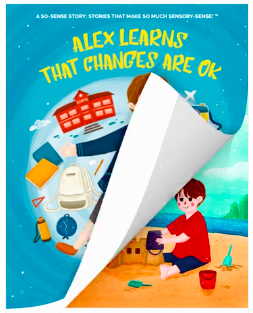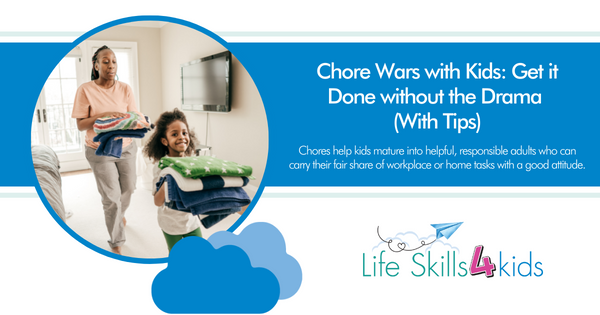Chores. No one likes them, right? Especially not kids. If it seems that there is always some problem, drama, or mysterious ailment that pops up at your house every time chores are mentioned, you’re not alone!
So, is it possible to get kids to do their chores without dramas? Or is that just wishful thinking on the part of every parent, everywhere?
Why don’t kids like chores?
Like most adults, children find chores boring. No one likes washing dishes or hanging clothes on the line.
But adults have the maturity to look beyond the immediate task to the more enjoyable activities once the chores are finished, whereas children tend to only see something they don’t want to do. And looking at a rack full of dishes or a pile of washing to be folded can take on monstrous proportions and drain kids of all motivation. As many parents would agree, children often spend far more time and energy trying to avoid the chore than they would expend if they actually did it.
Why should kids do chores?
As parents, it’s sometimes tempting just to do the chores ourselves and avoid the dramas, but this is not helpful to our kids, who need to learn responsibility and discipline as well as life skills. Have you ever met a colleague who avoided certain tasks whenever possible? Or an adult who had meltdowns or dramas whenever they faced something they didn’t want to do?
Chores help kids mature into helpful, responsible adults who can carry their fair share of workplace or home tasks with a good attitude.
So, how do we get kids to do their chores without fussing? Check out these helpful tips:
1. Set age-appropriate chores
While we often think of children’s development best occurring through play, chores also have a role. They teach responsibility and life skills within a framework of household routine, something that cannot be achieved through play.
Children should have age-appropriate chores; toddlers and young children can help with simple tasks such as putting dirty clothes in the hamper or pulling up the covers on their bed, while teens can tackle most tasks that an adult would do.
2. Show them how
Sometimes it’s important to show kids how to do a task, even if it seems simple to a parent. Show them step-by-step and make sure they understand how to do their chores (this helps to avoid excuses such as “but I don’t know how to do it!”)
3. Set the example
If the kids see a parent sitting on the couch watching TV or scrolling through the internet, you can bet that they won’t be motivated to do their chores, either. Set the example by making sure your chores done and show them that play is the reward for getting the work done.
4. Break it up
When chores are too large, they become overwhelming. Try writing out chore sheets for each section of the house (for example, in the kitchen, you might have washing the dishes, drying the
dishes, wiping the benches, putting the dishes away, and so on). Kids can tick off the chores as they are completed, and the job is less daunting.
5. Give them ownership
Some chores can be assigned on a roster system, such as feeding pets or doing the washing up. But others can be free choice. Write a list of chores and allow kids to pick which ones they do and when. This helps to give them ownership of the tasks they choose.
6. Keep chores visible
Get kids involved by having them write up a list of chores or create a tick sheet that they can tick or cross off when chores are complete. Keep the list in a prominent place to help reinforce structure and maintain your home routine.
7. Use positive affirmations
Kids love to hear that you’re pleased with what they’ve done. Offer appreciation and praise for jobs well done, and be specific. Take notice of things they’ve done well and tell them.
8. Turn chores into a game
Make chores fun. You could put on a favourite song and see how many toys you can put away by the time it’s finished. Who will be the winner of the sock-folding competition after five minutes? Set a timer for half an hour and see who can beat it to have their room clean before it goes off. There are many ways you can be creative and make chores fun.
9. Rewards = motivation
Some children respond positively to rewards. Use a rewards chart that can be ticked or have a sticker placed on each day’s completed chores. When a child has earned a certain number of ticks or stickers, they qualify for a reward. It doesn’t have to be something big – staying up later one night or extra screen time, for example. Earning a reward helps a child take ownership of their chores.
10. Make it about family
Chore time can be a great time for the family to spend together and can be followed by a reward that everyone can enjoy (think movie night, favourite dinner, or something else that everyone likes). Kids might not be enthusiastic about the chore, but they will remember the time you spent together as a family, especially if you made the chore fun and included a reward.
By working together, you can get your kids away from screen time and help them learn responsibility, discipline, teamwork, and the satisfaction of a reward for a job well done. Even better, you’re creating good habits for the future and lightening the load for busy parents.
For more handy parenting hints and tips, you can check out my website, www.lifeskills4kids.com.au, where you will find lots of useful resources and advice.
Alex loves school. He enjoys all the activities he does during the term such as swimming and soccer. He also loves holidays and all the fun things he gets to do while he’s not at school. The problem is, Alex doesn’t like changes. His tummy gets all tight and he gets a worry cloud that comes over his brain and makes it feel foggy. When the school term ends and holidays begin or when school is about to start again, Alex feels really worried and anxious.
Alex’s Mum doesn’t want him to worry. So she does some reading and finds a really cool trick that helps Alex to feel comfortable with changes. It works! Alex is able to keep his worries under control and think about all the fun things that are coming up instead. Can you guess what Alex’s special trick is.
Alex Learns that Changes Are Okay is a beautiful book for children who find change difficult.
When you purchase the Alex Learns that Changes are OK (Flipbook), you will receive a digital flipbook that gradually changes from one page to the next while listening to high-quality audio narration as if someone is flipping and reading the book for you!


